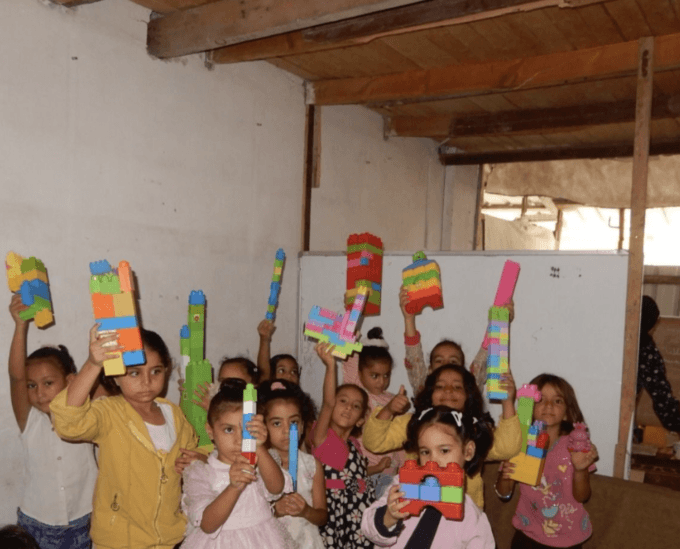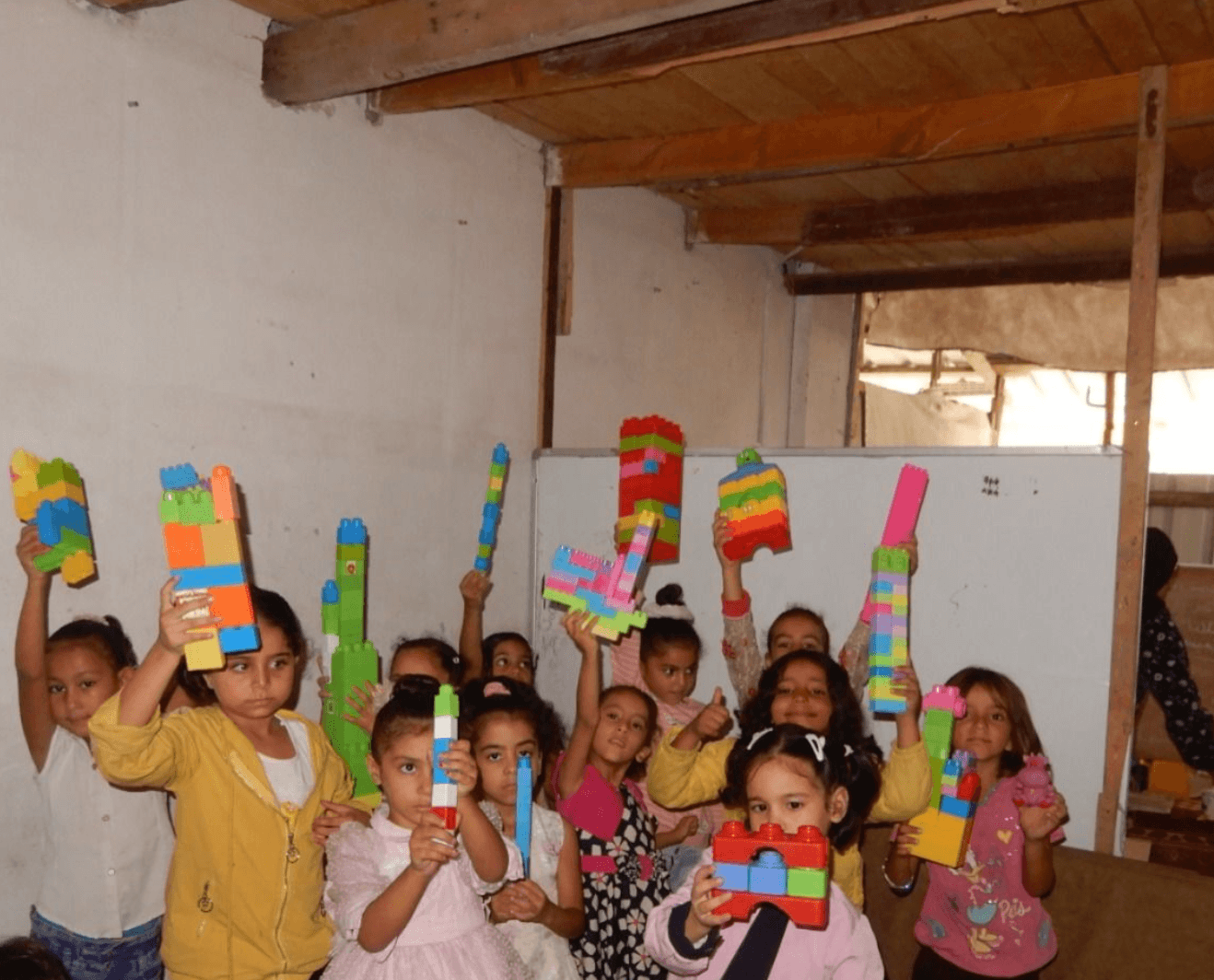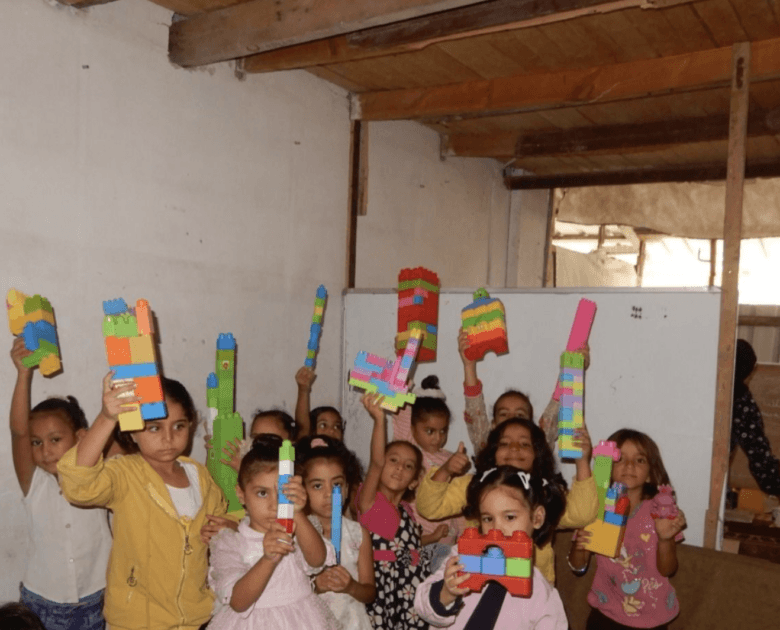






























































Donya Ahmad Abu Sitta’s kindergarten class.
Donya Ahmad Abu Sitta and her family were first displaced just four days into the war, on October 11, 2023. She told me, “They bombed our neighborhood in Khan Younis, so we evacuated to a nearby school that had been converted into a shelter. We were thinking the school would be safer than our home because it was under UN control. But after we were there for a month, they bombed the building next to the school. It was 6 a.m.; I awoke covered by glass shards because the blast broke the window beside me.”
Everyone fled the school. Donya and her family went to stay at a friend’s place. The next day, however, that apartment block was bombed, so, with nowhere else to go, they returned to the school. With bombs continuing to strike in and around the school grounds every day, Donya says, “We were forced to evacuate again, this time to another city, Rafah. But I felt like a part of my heart was still in Khan Younis.”
“The first thing I did in Rafah was to write my first article of the war, titled ‘We Died Four Times but We Are Still Alive.’ With that, I mean that we were targeted four times and survived, but we don’t want this survival after living a nightmare.”
“In Rafah,” she said, “we went to our aunt’s house and then set up our tent in Al Shaboura camp. At my aunt’s, we had good internet for the first time since the start of the war. It was the sixth of December. I remember that date—exactly—because when I checked the news, I learned the worst thing possible: that Dr. Refaat Alareer had been killed by the Israelis.”
A professor at the Islamic University of Gaza, Dr. Alareer had taught and inspired a generation of young writers, not only in his classroom but throughout Palestine. Donya participated in a project he started called We Are Not Numbers, in which experienced authors around the world worked with young writers in Gaza. She said, “I was not at his university but he taught me so much. When I heard the news that he’d been killed, I promised myself that I would continue doing the kind of work that Dr. Refaat had started. I would keep writing.”
For almost two years, several outlets, including The Electronic Intifada, Palestine Chronicle, and Drop Site News, have been publishing Donya’s on-the-scene accounts of people’s everyday struggles under Israel’s unrelenting assault. In her poetry—which includes a book and a book-in-progress—she expresses the inexpressible realities of life under genocide.
Here, you can hear her read one of her poems, with background instrumentation. It evokes an especially obnoxious trauma plaguing the people of Gaza during the past 21 months: the noise created by deadly drones constantly hovering overhead. When I asked her about drone noise, she answered with a mirthless chuckle and a single sentence: “If I had the power to delete just one thing from this world, it would be those things.” The source of her animosity goes far beyond noise. In June, she wrote that a drone operator had targeted her brother Karim, wounding him with shrapnel in the shoulder and back.
Donya’s family was able to return to their hometown of Khan Younis in May, 2024. There, between studying, writing, and other work, she also taught kindergarten. In a recent story for We Are Not Numbers, she relates that last November, she and her young students celebrated World Children’s Day with a meager but highly enjoyable meal. She told me, though, that she had an anxious moment when a student, Ibrahim, got the idea to run out to a Takiyya, an improvised, free soup kitchen in the area, and get some additional food to bring back and share.
She faced a horrible dilemma: How could she deny her student the chance to bring food for his desperately hungry classmates, but how could she let him go out into the dangerous streets? Her concern was justified; the occupation forces’ snipers were everywhere. Fortunately, two of Ibrahim’s classmates came to her (and Ibrahim’s) rescue, piping up to advise him not to go, that the Takiyya had already given out all the food they had for that day.
After Israel broke the brief ceasefire of early 2025, the bombardment of Khan Younis and other cities returned with a vengeance. Donya reported for The Electronic Intifada that on the morning of June 12, after enduring especially heavy bombardment overnight, “We could see the aftermath of the explosions. The black-gray smoke from the airstrikes suffocating the horizon; the white smoke from the tank shells snaking horizontally through the buildings.” At that moment her phone rang, and a robotic voice ordered her family to evacuate immediately. The family found themselves displaced yet again.

Image by Donya Ahmad Abu Sitta.
When we spoke two weeks later, she told me, “The seven of us are now in Dier-al-Balah [in central Gaza]. We moved into this lodging just two days ago. It’s a large room that we’ve divided into two parts. One is for studying during the day and sleeping at night. The other side is for other family activities. I’m not able to continue working with my kindergarten children, because they, like everyone, had to evacuate, and I don’t know where they all are now. But I do have three girls who I’m teaching here in Dier-al-Balah.”
With Israel having permitted no food shipments into Gaza for months, the family is dependent on the Takiyya and on what little they can afford on the outrageously costly private market, which is largely run by Israeli-supported gangs. Donya says they absolutely will not go to the U.S.-Israeli “Squid Game” slaughterhouses cosplaying as “aid distribution centers.”
Referring to the centers, Donya said, “I am now working on a new poem [title: “Inhuman in Human”]. It’s about the ‘Gaza Humanitarian Foundation,’ because that thing is not humanitarian and it’s not a foundation. It is so very dangerous to go to that place because it is part of a zone completely controlled by the Israeli Army. Every day when people go there to get food, the Israelis are targeting and killing them. My uncle was injured there. My mother has asked all of us not to go to that place. There is a woman here who is still searching for her son, who went to get food and has not returned.”
The Gaza Humanitarian (sic) Foundation (sic) shootings are pushing Gaza’s medical-care systems even closer to total collapse, says Donya. “One of the doctors at Nassar Hospital posted a message—it was so terrible—asking people to please not go to those sites—not because they don’t want them to get food but because if they get shot, the hospital doesn’t have the capacity to deal with them due to lack of medical supplies.”
“In this middle area of Gaza,” Donya said, “there is no major hospital, and all medical facilities are overwhelmed. Doctors and medical students are setting up ‘medical courts’ in each of the camps so they can deal with smaller injuries and the hospital can deal with the most severe ones. No medicine has entered Gaza since March, and blood stocks are badly depleted. When people go to donate blood, many are told they cannot because they have anemia or some other health problem”—conditions largely caused by Israel’s use of starvation as a weapon.
In contrast to Donya, who has met such terrible inhumanity with great valor (defined as “boldness and determination in facing great danger”), Israeli armed forces have displayed nothing but cowardice. Why are the occupation forces targeting civilians and not engaging in battle with the resistance forces? Her response: “The Israelis don’t distinguish between civilians and fighters. That was clear when at the start of the war, a minister referred to us as ‘human animals’ and announced that they would cut off food, water, and electricity—and they did that. In fact, it didn’t start with this war. They have been stealing our land since 1948 and have had us under siege for 17 years.”
What about water? “In Khan Younis, we were living next to Nasser Hospital, which had drinking water that people could come and get. Here, there’s no place for people to go for drinking water, so tanker trucks come around and distribute it. But it’s not good water, not clear. It’s a mix of daily-use and drinking water.” And fuel for cooking? “The food from the Takiyya is cooked, and otherwise most of what we get is canned, so we can get by mostly without cooking.”
“Students have missed many chances because of this siege,” she says. “They can’t leave Gaza to study at outside universities. Before this war, many of my friends said, ‘When the war ends, I want to travel outside, and I won’t return.’ People who are stuck in this miserable life; they say I will do this and this and this, but I know they don’t mean it. When there was an opportunity to leave Gaza at the beginning of the war, and my mother asked me if I wanted to get out, I told her, ‘No! I will not do that!’”
The occupation forces recently killed two of Donya’s friends, Roaa and Doaa. “I have tried to write something about them,” she said, “but when I start writing, I feel stuck. Still, I tell everyone caught in this war, “Don’t let the dark times make you think in a negative way, think positively. I have been thinking that way during all of this, and I find it’s a way to talk with friends when you are stuck.”
Despite being displaced a half dozen times, with hatred and death raining down on her homeland, Donya graduated from Al Aqsa University this spring with a degree in English language. Now, still in a war zone, she is setting out to study medicine. “I didn’t want to start this under these kinds of conditions,” she said, “but my friend Chana, who is helping edit my book, told me, ‘Yes, you can! Your country needs you more than ever.”
That’s very true, but Donya is not interested in being praised for her resilience and selflessness, or for her eloquence in documenting the horrors that Israel is inflicting on her people. She says, simply, “I feel it is my duty as a human. I keep working all day because I don’t want to be sitting and thinking of how life was then and how it is now.”
The post Valor in the Face of Inhumanity appeared first on CounterPunch.org.
This post was originally published on CounterPunch.org.